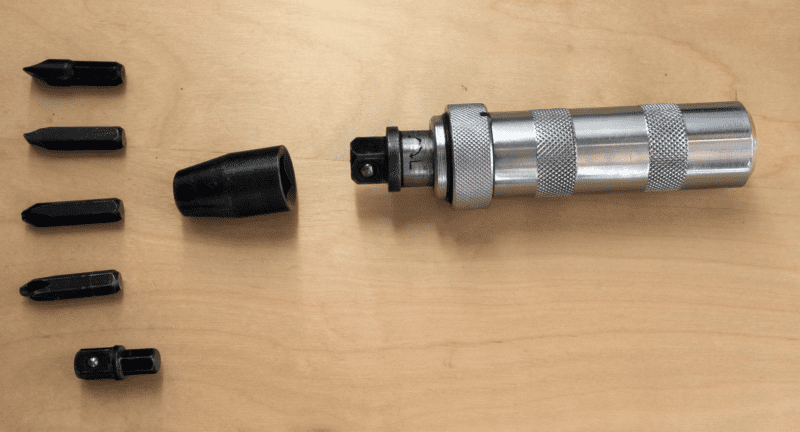Ahhhh, the good old days… that’s the sentiment that all of us feel from time to time—or maybe even most of the time. While we’re certainly not opposed to an appropriate level of sentimentality, we are living at the best time in the history of tools. The power and portability give the novice or apprentice a level of productive potential that the master craftsman could only dream about a few centuries ago. So when tradesmen worked in the good old days, what antique or vintage hand tools did they use? Let’s take a trip in the “way back machine” to explore a time before power tools. Cue the harp music and daydream sequence!
Table of Contents
- Vintage Hand Drilling Tools
- What Came Before the Impact Driver?
- The Vintage Hand Tool That Preceded the Impact Wrench
- Antique Hand Saw Tools That Led to the Reciprocating Saw
- Vintage Circular Saws and Table Saws
- Vintage Hand Tools Used Before the Band Saw
- Before the Chainsaw
- The Antique Hand Tools That Came Before the Electric Planer
- Before Power Tools We Had the Hand Miter Saw
- The Original Framing Nailers
Vintage Hand Drilling Tools
Evidence for the use of drill-like rotary tools dates back thousands of years. Builders have always needed holes in material for posts, fasteners, joints, and more. If only they could see the powerful, cordless drills we have today – and that goes for all of the tools on this list! What tools now accomplish mechanically used to require nearly all elbow grease and little ingenuity. From long wooden handles attached in a “T” shape with the bit to egg beater style, and even a bow around a stick – the drill’s come a long way, baby.
What Came Before the Impact Driver?
The impact driver is probably the new kid on the block, relatively speaking. In contrast with the drill’s static rotational force, the impact’s pulsing rotational force is a fresh concept. Throughout most of history, craftsmen were satisfied with simply driving and removing fasteners.
But sometimes power drills would over-torque fasteners. And then again, sometimes the job required more torque than a screwdriver could deliver. Workers needed a tool that could complete the job. A quick Google-Fu reveals that the precursor to today’s power impact driver got its patent in the 1960s.
The Vintage Hand Tool That Preceded the Impact Wrench
Like the impact driver, the impact wrench is a fairly modern tool that leverages electrical mechanical power to create a pulsing rotational force. Before today’s impact wrenches, tradesmen could attach a socket to their manual impact drivers and hammer away. You can still find these vintage hand tools at flea markets across the country. More commonly, people used a lug wrench like a tire iron or simply a combination wrench.
Antique Hand Saw Tools That Led to the Reciprocating Saw

In the How Did We Get Along Without It category, we have the reciprocating saw. Its history is probably most well-known since the saw is indispensable on most job sites today.
Milwaukee Tool scored an innovation for the ages when, in the 1950s, they introduced the motorized hacksaw. Of course, that description reveals the recip saw’s precursor: the hacksaw. In the form we recognize it, the fine-toothed metal-cutting hacksaw had been around since the late 1800s. In those days, cutting was done with only the sawyer’s grit. Now there’s a lot to be said for grit, but let’s save it for pushing forward in tough times, not cutting through a piece of metal. For that, we have our choice of the best Milwaukee SawZalls.
Vintage Circular Saws and Table Saws
The history of the circular saw is a bit muddled. Who invented what, and when it was invented, isn’t immediately clear. Shaker Sarah “Tabitha” Babbitt generally gets the credit for inventing the first circular saw used in a mill in America.
In any event, the ancestor of today’s power circular saws used the belt-drive concept for sawing large timbers into planks. Tough work, to be sure. Even tougher work was what inspired Babbitt in the first place: men using a two-man whipsaw over a pit.
Vintage Hand Tools Used Before the Band Saw
Much like the circular saw, the precursor to today’s power band saw was a manual one. William Newberry filed a patent for the ancestor of one of today’s carpentry shop’s most valuable tools in the early 1800s. In this case, the operator used foot pedals to power the saw. What did we do before Mr. Newberry conceived of an effectively endless saw blade? We used labor-intensive, back-and-forth motions coupled with a handheld saw.
Before the Chainsaw

Before the chainsaw, many tools existed to cut down trees. One of our favorites, of course, has to include the ax. Swing an ax long enough and with enough accuracy and the tree comes down. People still use them today to chop wood, but back then they also did the primary job of felling trees.
And we know what you want to suggest—what about those large hand saws? Well, those definitely played a role in cutting larger-diameter trees. They all came after the ax, however—so we wanted to start there and give it its proper due.
The Antique Hand Tools That Came Before the Electric Planer

Achieving flat, consistent wood surfaces is simple, right? Plug in a handheld plane and guide it across the broad areas of the piece. Or, you could just feed a plank of wood into one side of a planer, and the plank exits the other side as smooth and flat as could be.
Of course, it wasn’t always so easy. There’s perhaps no vintage hand tool more iconic of carpentry than the old-fashioned hand planer. It existed in many different sizes for different-sized jobs. But all of them allowed a sharp blade to just peek below the plane’s flat bottom. Then the skilled craftsman would work the plane over the wood, removing high spots and creating a uniform thickness.
The sole tool on the list that hasn’t been completely supplanted by a power version? The hand plane. In fact, it’s still the most practical option in some cases – whether for truing up a sticky door frame, chamfering an edge, or just smoothing out a rough surface. For the purists among us, there’s a higher level of satisfaction that comes from working a piece with a hand plane.
Before Power Tools We Had the Hand Miter Saw
If the table saw is the cornerstone of the jobsite or shop, the miter saw is the keystone. This indispensable tool made crosscuts for trim work that included angles (miters) and bevels. But the tradesmen of yesteryear were nothing if not resourceful, and they had their own manual vintage hand tools. Although you can still buy such miter boxes and saws today, you’re not likely to see them in use! Alternative miter systems were a bit more sophisticated, but we sure are happy with modern-day versions!
The Original Framing Nailers

We could talk about antique and vintage hand tools all day long… actually, we do! Sweet gig. But we’ve got to land this plane (the air version, not the hand one). So we’ll wrap up with the greatest tool of all time: the framing hammer. Before pneumatic tools or battery-powered nailers came the tried-and-true hammer.
Workers have used the nail for millennia. You have to figure that the nail’s been doing something right. Over time, the nail delivery system improved even as the nail itself stayed about the same. Today, we drive brad, finish, roofing, and even framing nails with nail guns. These make quick, easy work of driving. Pneumatic power drives a majority of these tools, however, gas and battery-powered nailers continue growing in popularity.
Quite often, nails are installed as they always have been—with a good ol’ hammer.
Did We Miss Anything?
Thanks for joining us for this trip down memory lane of what did they use before power tools. If you’re a Pro and you have some tool nostalgia, reach out to us!










